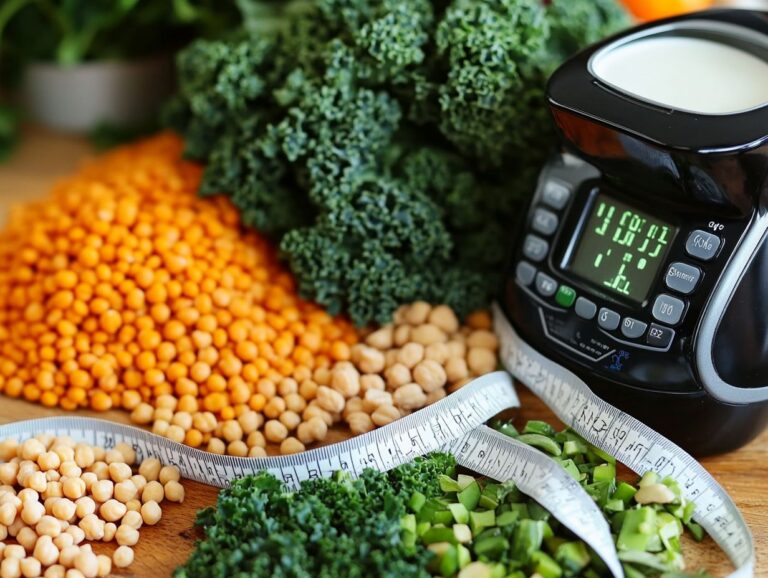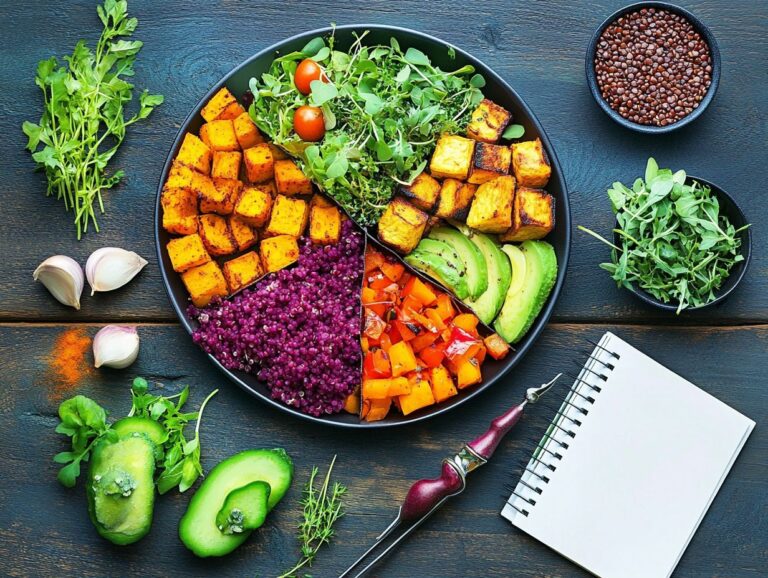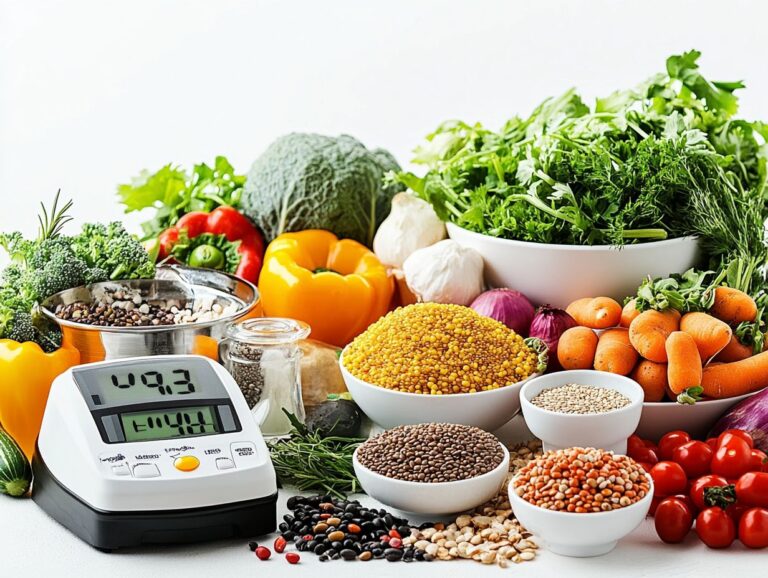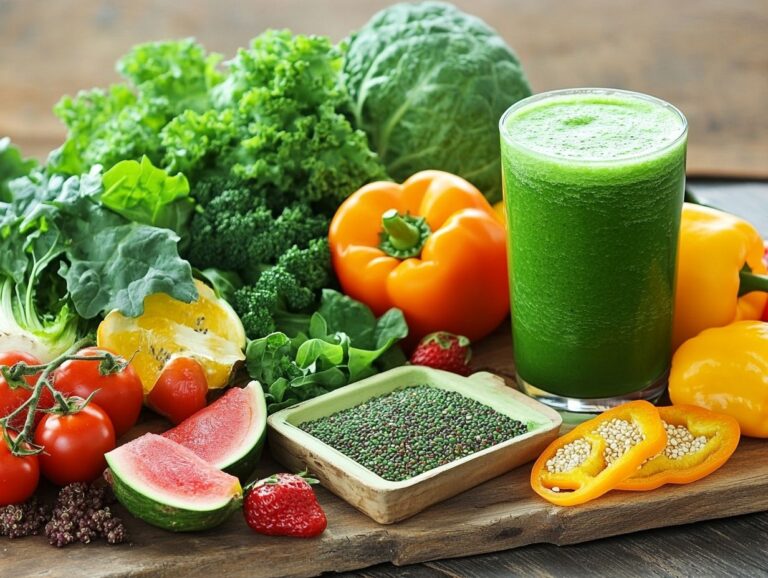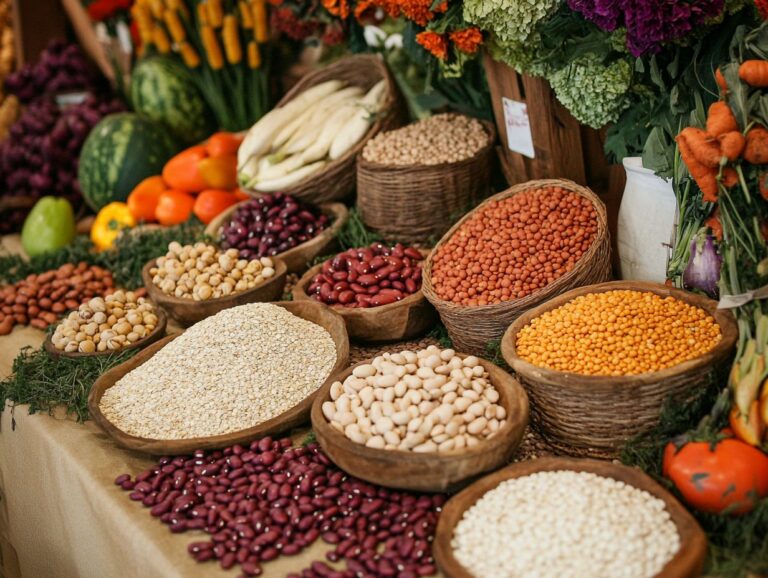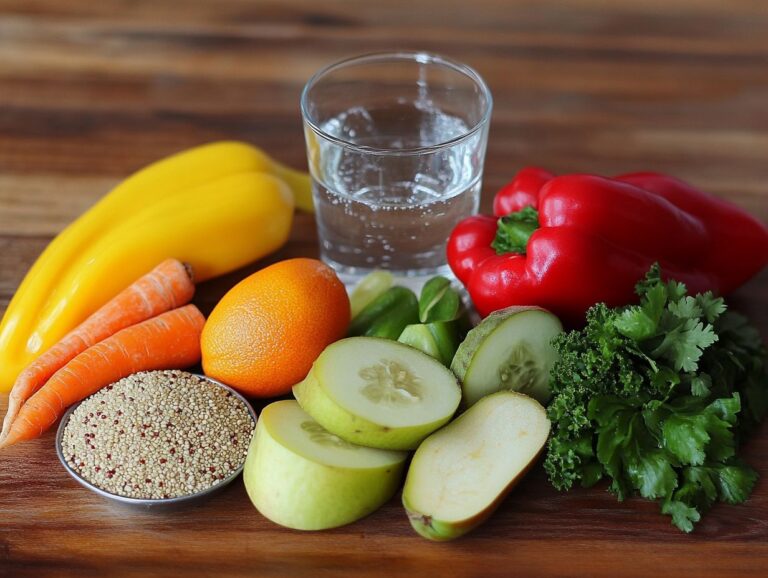A vegan detox diet is a plant-based dietary approach that helps eliminate toxins from the body while also enhancing energy levels and digestion. This article explores how a vegan detox diet functions, its various benefits, and the foods you should consume or avoid. Whether you are contemplating a short cleanse or making a long-term commitment, this guide provides you with all the information you need to embark on your journey toward better health.
What is a Vegan Detox Diet?
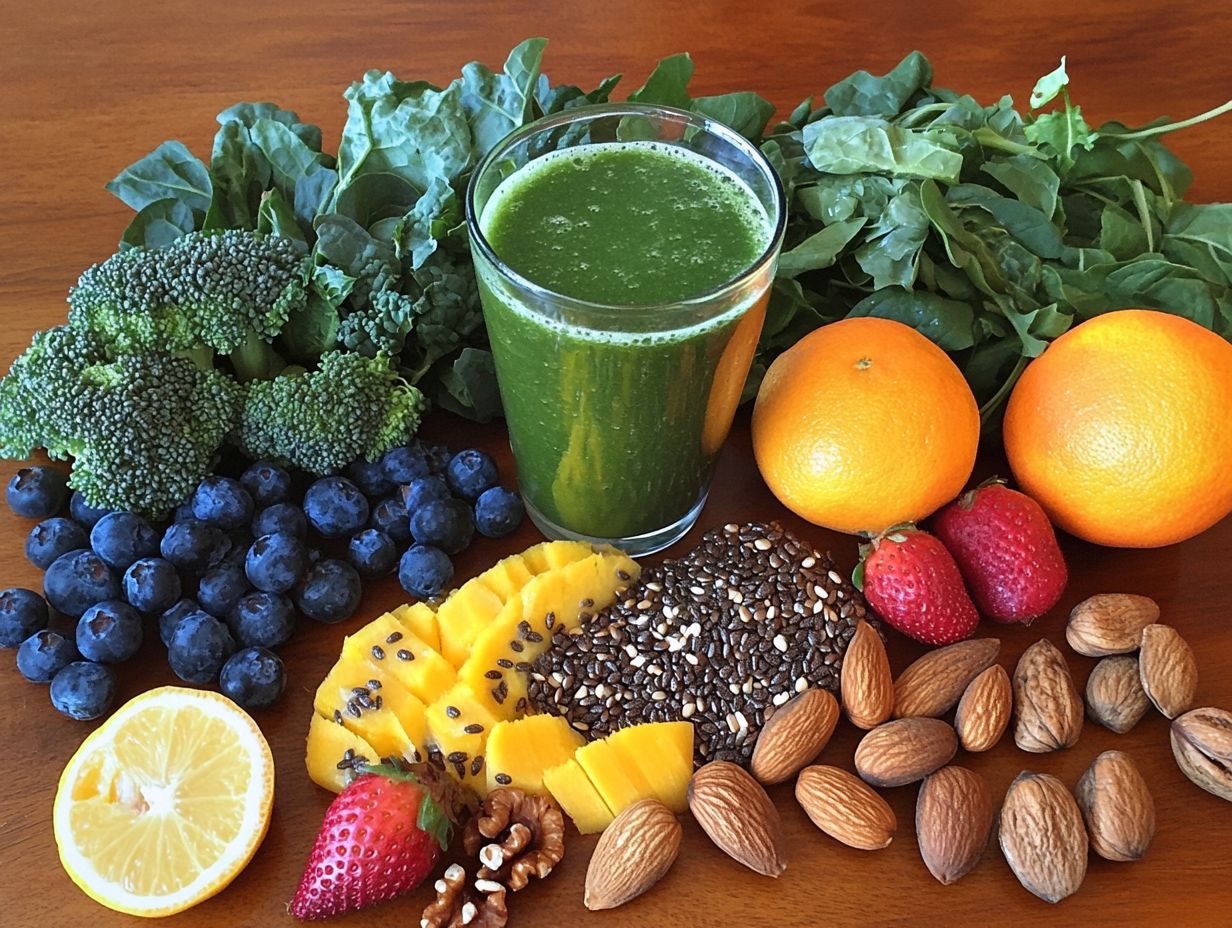
A Vegan Detox Diet is a lifestyle change that emphasizes the consumption of wholesome, natural foods to detoxify your body from unhealthy substances, often guided by a registered dietitian or plant-based chef.
This diet focuses on whole grains, legumes, fresh fruits, and fresh vegetables, while also incorporating high-fiber whole foods, plant-based protein, and nutrient-dense ingredients, which promotes healthy eating habits and glowing skin.
By incorporating plant-based alternatives, such as seasonal plants and nutritious plant foods, the diet helps reduce inflammation, improve energy, and enhance better digestion, ultimately supporting a healthier lifestyle.
How Does a Vegan Detox Diet Work?
A Vegan Detox Diet operates by emphasizing nutrient-dense ingredients and plant-based alternatives that aid in detoxifying your body. This approach promotes healthy choices and boosts energy levels while cutting out processed foods.
The process generally involves easy-to-follow vegan meal plans that feature high-fiber whole foods, such as fruits, vegetables, legumes, and whole grains, enabling a diverse range of plants to be included in daily meals.
What are the Benefits of a Vegan Detox Diet?
The benefits of a Vegan Detox Diet include improved energy levels, reduced inflammation, enhanced digestion, and overall health and wellness.
By incorporating high-fiber whole foods, fresh vegetables, and legumes, this diet can significantly decrease the risk of diabetes, heart disease, and certain types of cancer. These foods are rich in essential nutrients and antioxidants, contributing to better health outcomes.
1. Eliminates Toxins from the Body
The benefits of the Vegan Detox Diet include the removal of toxins from the body, achieved through the elimination of processed foods and the inclusion of healthy whole foods, healthy fats, and high-fiber whole foods.
This dietary shift is a crucial aspect of the overall health benefits associated with the Vegan Detox Diet, as it enables the body to detoxify naturally. In contrast to processed foods, whole plant-based foods such as avocados, nuts, and seeds provide healthy fats that support cellular function.
Additionally, fiber-rich foods like leafy greens, legumes, and whole grains help bind and eliminate accumulated toxins, promoting proper digestive function. Fruits such as berries and apples offer antioxidants that further aid the detoxification process, highlighting another significant benefit of the Vegan Detox Diet for the body.
2. Boosts Energy Levels
A vegan detox diet can significantly improve energy levels because fresh fruits, whole grains, and healthy fats provide sustained energy without the crashes associated with processed foods.
These natural food sources are rich in essential nutrients, including vitamins, minerals, and fiber, which help boost metabolic functions and enhance overall vitality, contributing to a lean plant-based diet.
For example, fresh fruits such as bananas and berries offer quick energy from their natural sugars, while whole grains like quinoa and oats supply complex carbohydrates that release energy gradually.
To maximize convenience, meals should be prepared in large batches, and fruits and whole grains should be chopped in advance for easy access. This approach not only saves time but also helps you avoid unhealthy snacks, supporting consistent energy levels throughout the day.
3. Improves Digestion
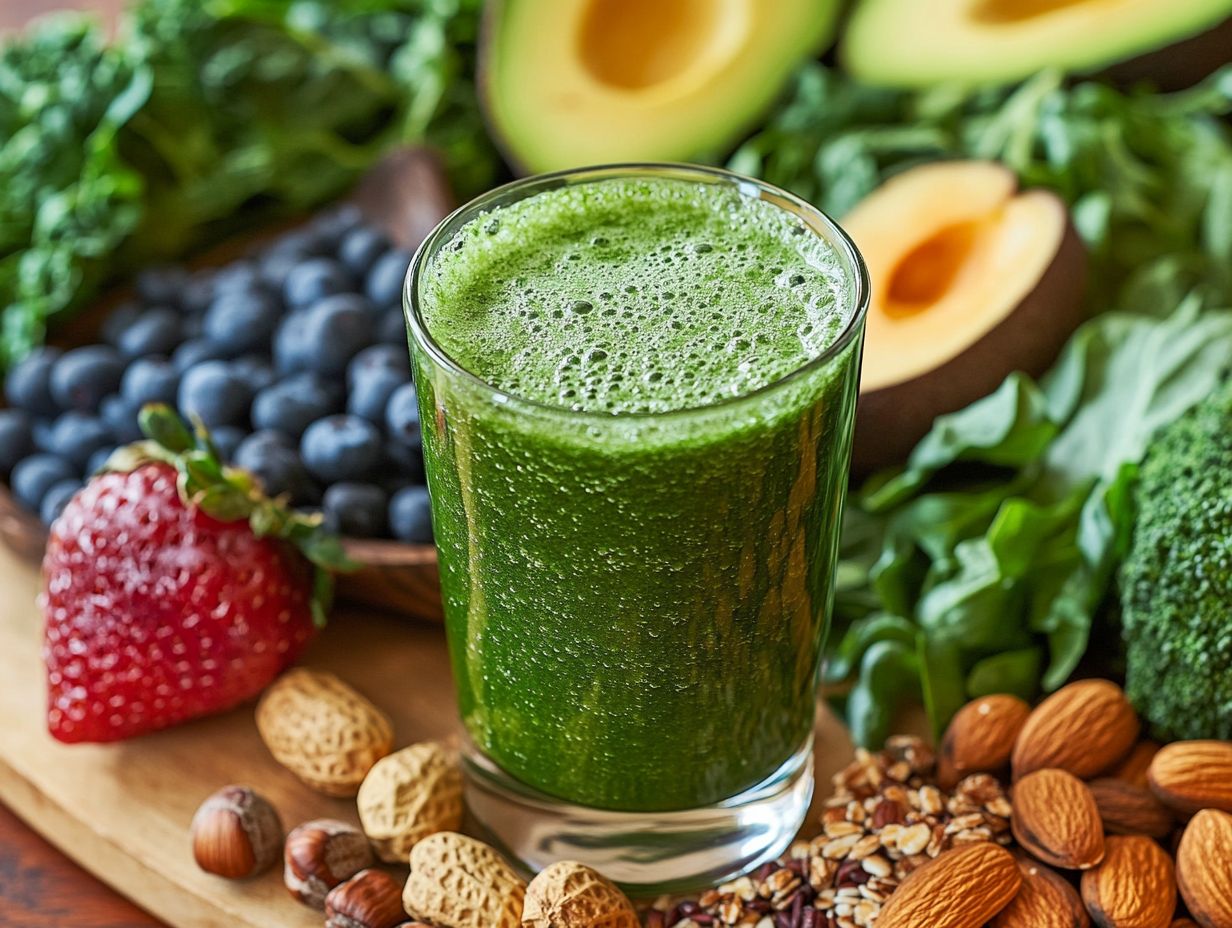
A Vegan Detox Diet is beneficial for digestion as it encourages the consumption of high-fiber whole foods, including legumes and whole grains, which promote regular bowel movements and enhance gut health.
Fruits and vegetables with high water content, such as cucumbers, oranges, and berries, aid in maintaining hydration, further improving the digestive process.
Incorporating foods like lentils, quinoa, and chia seeds into meal plans can help meet daily fiber requirements and support a balanced gut microbiome.
Two excellent meal options that boost digestion are:
- A smoothie made with spinach and banana
- A chickpea salad
Both of which are rich in fiber and essential nutrients. Regular consumption of these foods can help reduce bloating, alleviate constipation, and improve overall digestive health, making a plant-based diet not only beneficial but also revitalizing.
4. Promotes Weight Loss
The Vegan Detox Diet promotes weight loss by providing vegan weight-loss meals that consist of healthy whole foods that are lower in calories while remaining nutrient- and fiber-rich. These high-protein meals help individuals lose weight while ensuring they feel satisfied and full throughout the day.
The diet incorporates various plant-based proteins, such as lentils, chickpeas, and quinoa, along with fiber-rich foods like leafy greens, whole grains, and berries, as part of diverse plant-based recipes.
Since the Vegan Detox Diet encourages the consumption of six small meals throughout the day, meal prepping becomes essential. Spending a few hours each week preparing and portioning meals can help individuals stay on track with their weight loss goals.
Preparing soups and stews in bulk, as well as assembling salads that require minimal preparation, can be especially beneficial.
What Foods are Allowed on a Vegan Detox Diet?
A Vegan Detox Diet primarily consists of fresh fruits and vegetables, whole grains, nuts and seeds, and legumes, providing all the essential nutrients needed for a healthy lifestyle.
1. Fruits and Vegetables
Fruits and vegetables play a crucial role in the Vegan Detox Diet, providing essential vitamins, minerals, and antioxidants that nourish the body and aid in detoxification. These nutrient-rich foods not only replace vital nutrients that may have been depleted during the detox process but also enhance the body’s natural ability to eliminate toxins.
Seasonal fruits, such as berries rich in anthocyanins, significantly boost antioxidant levels. Leafy greens like kale and spinach are high in iron and calcium and contain chlorophyll, which possesses detoxifying properties.
Incorporating these foods into smoothies, salads, or stir-fries elevates meal plans and maximizes their health benefits.
2. Whole Grains
Whole grains are a crucial component of the Vegan Detox Diet, as they provide fiber and essential nutrients that help maintain energy levels and promote digestive health over extended periods.
Including a variety of whole grains, such as quinoa, brown rice, barley, and farro, enhances the nutritional quality of meals.
Quinoa is often referred to as a super grain because it is a complete protein, containing all the essential amino acids. In contrast, brown rice is an excellent source of B vitamins and minerals.
These grains are high in dietary fiber, which aids digestion and helps stabilize blood sugar levels, a particularly important factor in detox diets.
Whole grains not only help keep you feeling full while delivering vital nutrients but are also linked to improved heart health as part of a balanced diet.
3. Legumes
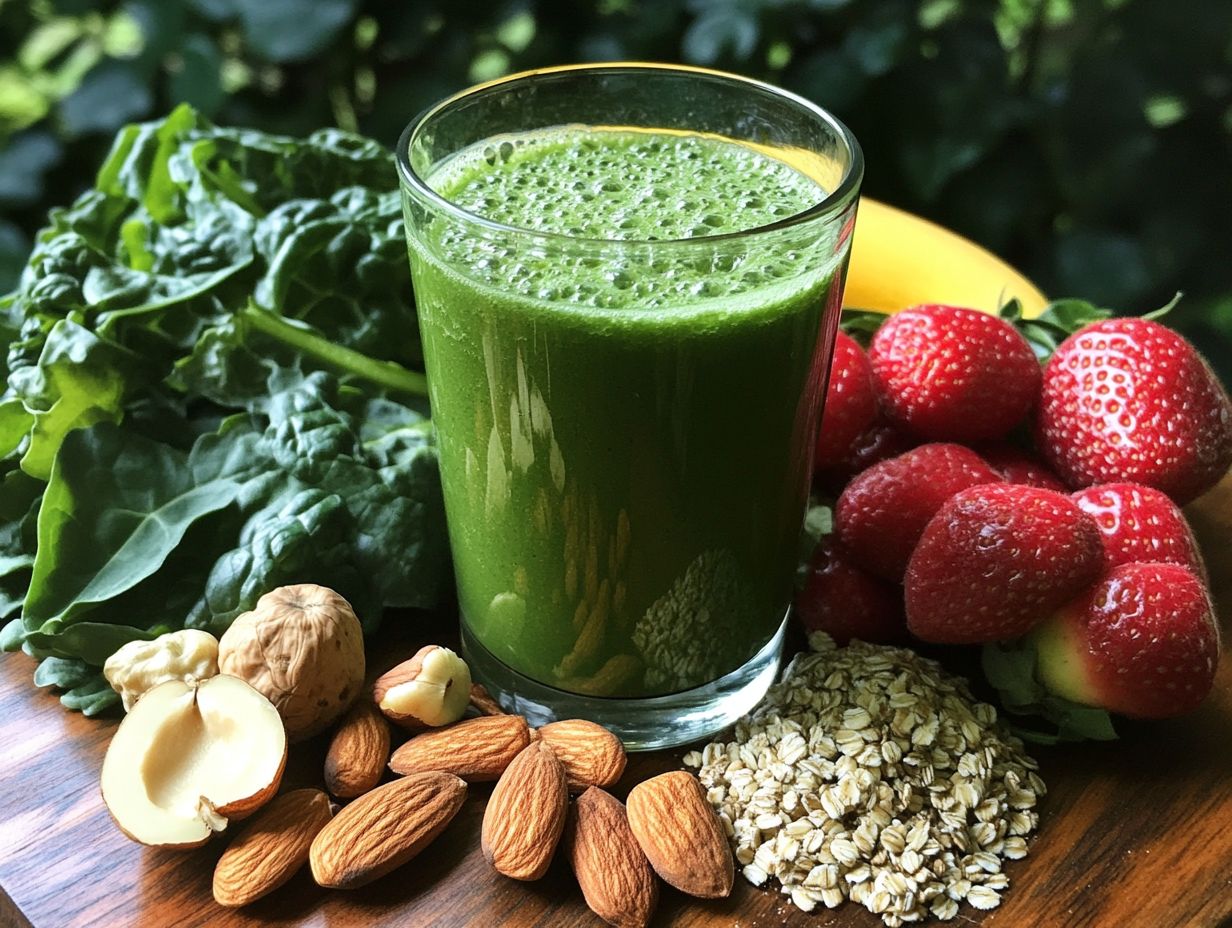
Legumes are an essential source of plant-based protein and fiber in a Vegan Detox Diet, aiding digestion and providing energy while promoting a sense of fullness.
Whether it’s the peppery flavor of lentils, the creamy texture of chickpeas, or the earthy richness of black beans, incorporating these legumes into meals can significantly enhance nutritional intake, providing both protein fiber and heart health benefits.
Each variety offers unique health benefits; for example, lentils are rich in iron and folate, while chickpeas are known for their ability to stabilize blood sugar levels. Black beans provide antioxidants that support heart health.
To easily incorporate these nutrient-dense foods into your daily meal prep, consider preparing:
- Hearty lentil soups
- Chickpea salads
- Black bean tacos
Ensuring a delicious and health-boosting experience.
4. Nuts and Seeds
The Importance of Nuts and Seeds in a Vegan Detox Diet: Nuts and seeds are essential components that provide healthy fats, protein, and vital nutrients, all of which support overall health and promote a feeling of fullness.
Benefits of a Vegan Detox Diet: Incorporating a variety of nuts and seeds into your diet can enhance heart health, improve digestion, and boost energy levels.
Examples of Nut and Seed Benefits: For instance, almonds are rich in vitamin E, magnesium, and fiber, which can aid in maintaining a healthy weight and lowering cholesterol levels. Chia seeds are packed with omega-3 fatty acids and antioxidants, helping to reduce inflammation and promote skin health. Flaxseeds are another nutritional powerhouse, offering high levels of lignans that may support hormonal balance.
Usage Guidelines: To maximize these benefits, consider enjoying a handful of almonds as a midday snack, blending chia seeds into smoothies for a nutritious breakfast, or sprinkling ground flaxseeds over salads or oatmeal. Aim for a portion size of about one ounce for nuts and one tablespoon for seeds to meet your daily nutrient needs effectively.
What Foods Should be Avoided on a Vegan Detox Diet?
On a Vegan Detox Diet, it is important to avoid the following foods to support liver function and maintain insulin resistance:
- processed foods
- dairy products
- meat and animal products
Consuming these items can interfere with the body’s detoxification process and potentially lead to health complications, such as heart disease and certain types of cancer.
1. Processed Foods
Processed foods contain unhealthy ingredients and added sugars that can disrupt the body’s natural detoxification processes, making them a primary food group to avoid on a Vegan Detox Diet. These foods often include sugary cereals, prepackaged snacks, and fast food, all of which are laden with preservatives and artificial substances that can interfere with metabolic functions. Cutting out processed foods and opting for healthy whole foods can support liver function and improve overall health.
For example, consuming sugary drinks can lead to inflammation and insulin resistance, significantly hindering the body’s ability to detoxify. Eliminating these processed options allows individuals to restore their body’s natural balance, which can enhance energy levels, improve digestion, and promote clearer skin. Incorporating more high-fiber whole grains and plant-based protein can further support this detox process.
By opting for whole foods such as fresh fruits and vegetables, the body benefits from essential nutrients that support cellular repair and rejuvenation, ultimately leading to more effective detoxification and better health outcomes. Incorporating nutrient-dense ingredients like quinoa, chia oatmeal, and legumes can further enhance these benefits.
2. Dairy Products
Dairy products should be avoided in a Vegan Detox Diet due to their potential to cause inflammation and digestive issues, making plant-based alternatives a healthier choice. Many individuals experience intolerances or sensitivities to lactose, leading to discomfort and health complications. Plant-based alternatives like almond milk, coconut yogurt, and edamame can provide essential nutrients without the drawbacks associated with dairy.
Additionally, the saturated fats found in traditional dairy can exacerbate heart-related issues, while the hormones present in cow’s milk may disrupt the body’s hormonal balance. Choosing healthy fats from plant-based sources like avocado and nuts can provide beneficial nutrients while avoiding these issues.
By choosing alternatives such as almond milk or coconut yogurt, individuals can enjoy delicious and nutritious options that enrich their diets without the drawbacks associated with dairy. Almond milk is low in calories and is a good source of vitamins, particularly vitamin E, while coconut yogurt is rich in probiotics, which promote gut health. These alternatives can be part of a diverse range of plant-based recipes that contribute to better digestion and overall wellness.
These substitutes facilitate a smoother transition to a plant-based lifestyle without sacrificing taste or nutrition.
3. Meat and Animal Products
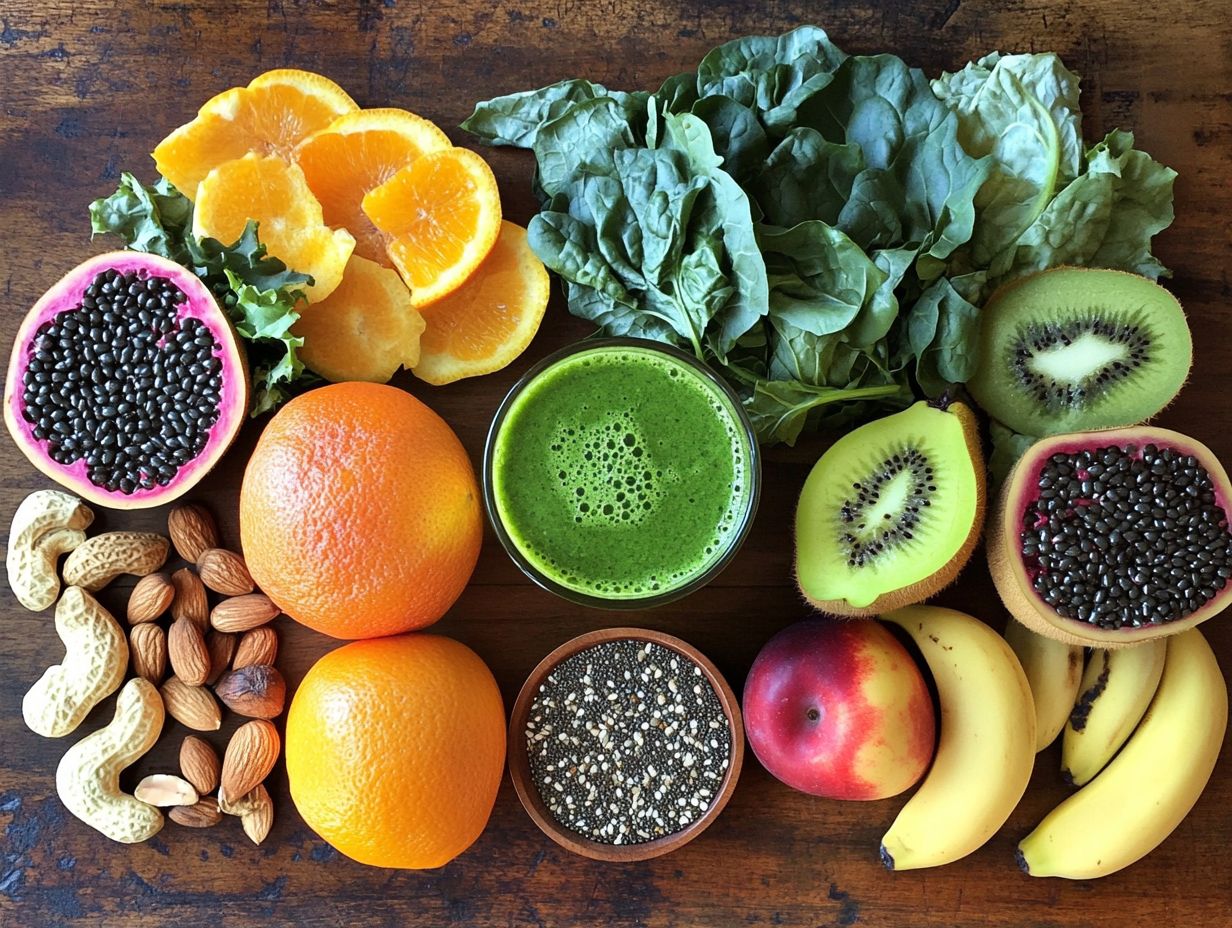
A Vegan Detox Diet eliminates meat and animal products due to the health issues associated with their consumption, such as increased inflammation and the potential for chronic diseases. This diet advocates for plant-based alternatives, which can provide a wide variety of nutrients and health benefits.
Growing evidence suggests that the consumption of these products may be linked to a higher risk of heart disease, diabetes, and obesity. Additionally, highly processed meats have been associated with increased rates of specific cancers, prompting many individuals to reevaluate their dietary habits. Transitioning to a vegan diet can decrease the risk of diabetes and other health issues.
By transitioning to a plant-based diet, individuals can benefit from a wealth of nutrients, fiber, and antioxidants, all of which are known to enhance overall health and well-being. This lifestyle change can aid in weight loss, improve energy levels, and promote better digestive health, leading to a more fulfilling life. High-protein meals and easy-to-follow meal plans can help support this dietary transition.
How Long Should a Vegan Detox Diet Last?
The Vegan Detox Diet can vary in duration to accommodate individual goals and health conditions, providing flexibility for those looking to detox from unhealthy foods and adopt healthier eating habits.
It includes:
- Short-term detox plans lasting 3 to 7 days,
- Long-term detox plans of 10 to 14 days,
- Ongoing detox approaches that last 30 days or more.
1. Short-term Detox (3-7 days)
A short-term detox lasting 3 to 7 days is an excellent way to kickstart healthy eating habits and can include a 3-day detox plan focused on eliminating toxins and unhealthy foods. This brief period allows newcomers to experience benefits such as increased energy, improved digestion, and enhanced mental clarity. Sample meal plans could include vegan pancakes, black bean soup, and roasted veggie bowls to provide variety and nutrition.
A structured approach typically features simple meal ideas centered around whole foods, including fruits, vegetables, lean plant-based proteins, and whole grains, making it both manageable and satisfying. Incorporating seasonal plants can add variety and freshness to meals.
Snack options like nuts, seeds, and yogurt can help curb cravings while providing energy. Hydration is also essential; incorporating herbal teas, infused detox water, and plenty of fluids can enhance the detox experience by flushing out impurities and keeping the body refreshed. Meal prep tips from experts like Victoria Seaver can help make this process easier and more effective.
Overall, this structured plan serves as an excellent introduction for individuals looking to reset their dietary choices.
2. Long-term Detox (10-14 days)
A long-term detox lasting 10 to 14 days allows for a thorough cleansing of the body and can serve as a significant lifestyle change, fostering a deeper commitment to healthy eating habits. Following a structured vegan meal plan can help ensure all nutrient needs are met while detoxifying your body.
This structured period promotes not only physical wellness but also mental clarity and emotional balance. By embracing this journey, individuals can gain a better understanding of their relationship with food and recognize their body’s specific needs. Consulting with registered dietitians can provide personalized advice and support throughout this process.
Meal planning becomes essential during this time; incorporating a variety of whole foods, such as fruits, vegetables, lean proteins, and healthy fats, can create delicious and satisfying meals while ensuring that essential nutrients are met. Reading resources like “EatingWell.com” can provide additional meal plan tips and recipes.
Challenges may arise, including cravings and social situations that tempt individuals to revert to old habits. Overcoming these hurdles can build resilience and give the power to individuals to make lasting improvements in their dietary choices, ultimately leading to better overall health and vitality. Expert advice from plant-based chefs like Alexandra Caspero Lenz can offer valuable insights and inspiration.
3. Ongoing Detox (30+ days)
A detox program lasting 30 days or more can yield sustained health benefits and promote adherence to a vegan diet, encouraging lasting changes in dietary habits and overall wellness. This approach can support weight loss, reduce inflammation, and lead to glowing skin.
These programs facilitate a re-evaluation of one’s relationship with food, leading to improved energy levels and reduced inflammation, which can help mitigate long-term health issues. Incorporating high-protein meals and diverse range of plants can further enhance these benefits.
Incorporating whole foods such as fruits, vegetables, nuts, and seeds provides a nutrient-dense foundation that supports essential bodily functions. High-fiber whole grains and plant-based protein sources like edamame and legumes can contribute to overall health and wellness.
To ease into this new phase, it is important to gradually eliminate processed foods and sugars while increasing fluid intake and physical activity. Following a sugar-detox meal plan can help reduce cravings for sweet foods and support a healthier lifestyle.
Practicing mindfulness while eating fosters a deeper awareness of one’s relationship with food, transforming the detox process into a holistic wellness journey. Resources like “Fresh Italian Cooking” by Alexandra Caspero Lenz can provide additional inspiration and guidance.
Is a Vegan Detox Diet Safe?
A well-planned Vegan Detox Diet can be safe, especially when supervised by a registered dietitian, to ensure that nutritional needs are met while minimizing potential health risks. Registered dietitians like those at “Delish Knowledge” can offer personalized advice and support.
Although this dietary pattern can offer health benefits, individuals must be mindful of the risk of nutrient deficiencies, particularly in protein, iron, and vitamin B12. To mitigate these risks, it is essential to incorporate a wide variety of plant-based foods, such as legumes, whole grains, nuts, and seeds, into meal preparation. High-quality sources like “The Plant-Based Baby + Toddler” by Alexandra Caspero Lenz can offer valuable guidance on ensuring adequate nutrition.
Balanced meal planning not only ensures adequate nutrient intake but also enhances the satisfaction and sustainability of the diet. Consulting with a healthcare professional can help tailor the detox process to individual needs and health conditions, thereby improving both safety and effectiveness. Regular check-ins with professionals from institutions like Harvard Medical School and the University of Vermont can also provide additional support.
How to Transition Back to a Regular Diet After a Vegan Detox?
The transition back from a Vegan Detox Diet should be approached with care, gradually reintroducing foods while prioritizing healthy eating and sustainable choices to ensure lasting positive results. Following meal prep tips from experts like Victoria Seaver at “EatingWell Editorial” can make this transition smoother and more successful.
When reintroducing normal foods, it is important to focus on incorporating a variety of whole foods, including fruits, vegetables, whole grains, and lean proteins. This approach helps maintain a balanced intake of nutrients and avoids processed foods that could counteract the benefits achieved during the detox period. Incorporating vegan weight-loss meals can support ongoing health goals.
Practicing moderation is essential; allowing for occasional treats without guilt helps prevent cravings from leading to an unhealthy overall diet. Additionally, staying hydrated and being attentive to the body’s hunger signals can promote mindfulness regarding food choices. Expert advice from resources like “Delish Knowledge” can support this balanced approach.
By emphasizing whole, nutrient-dense options, individuals can successfully transition back to regular eating while fostering healthy long-term habits. Incorporating a diverse range of plants and seasonal vegetables can ensure a wide range of nutrients and flavors.
